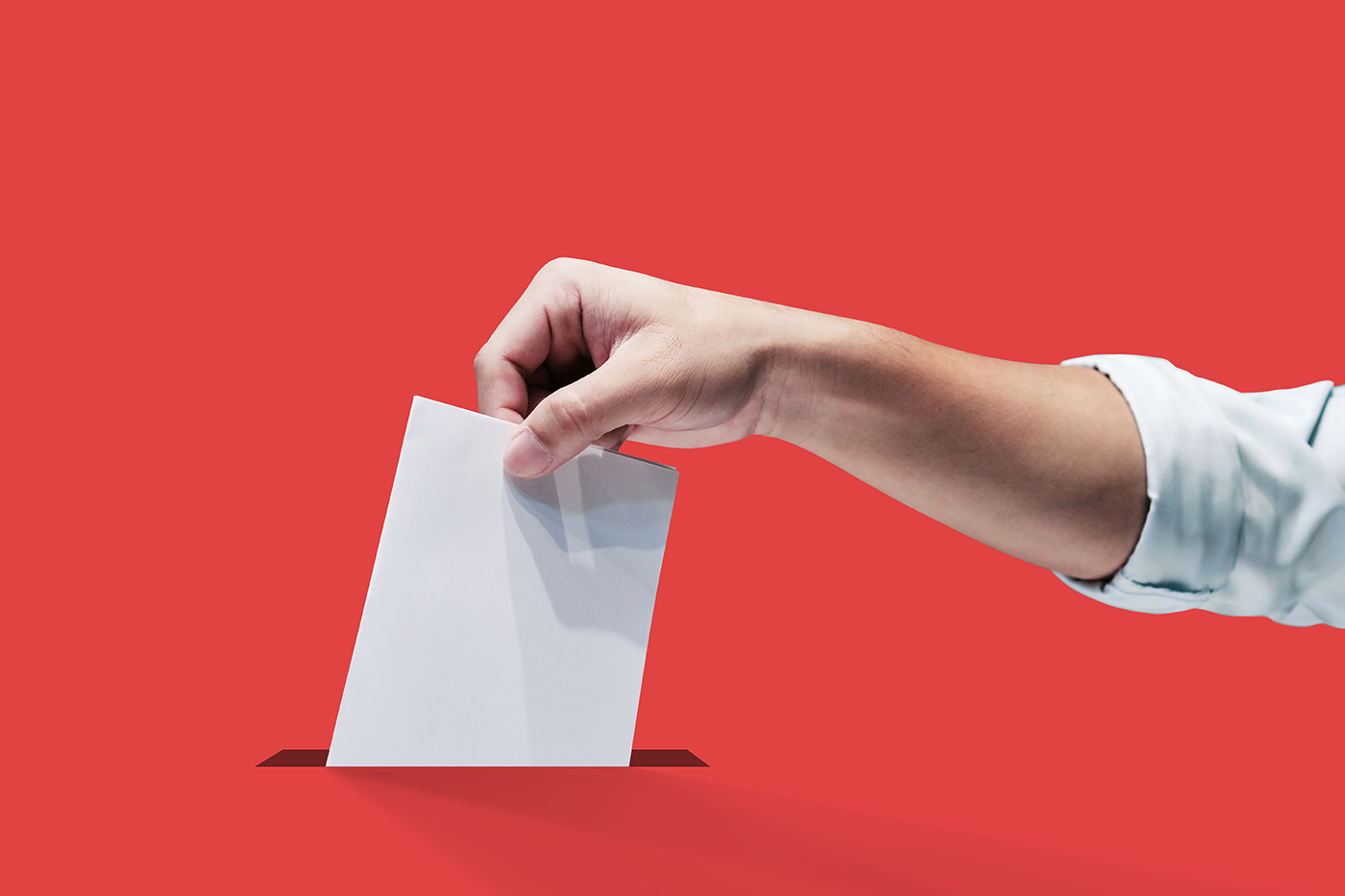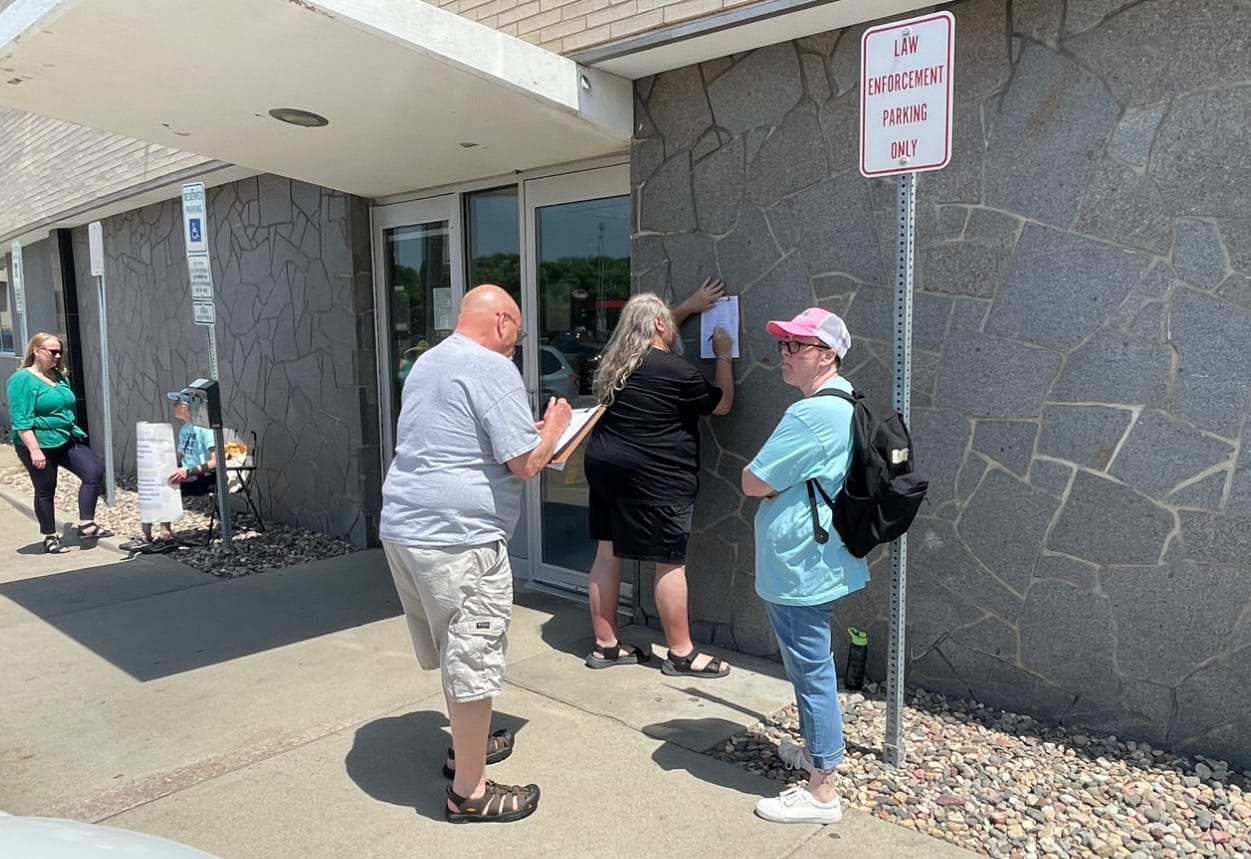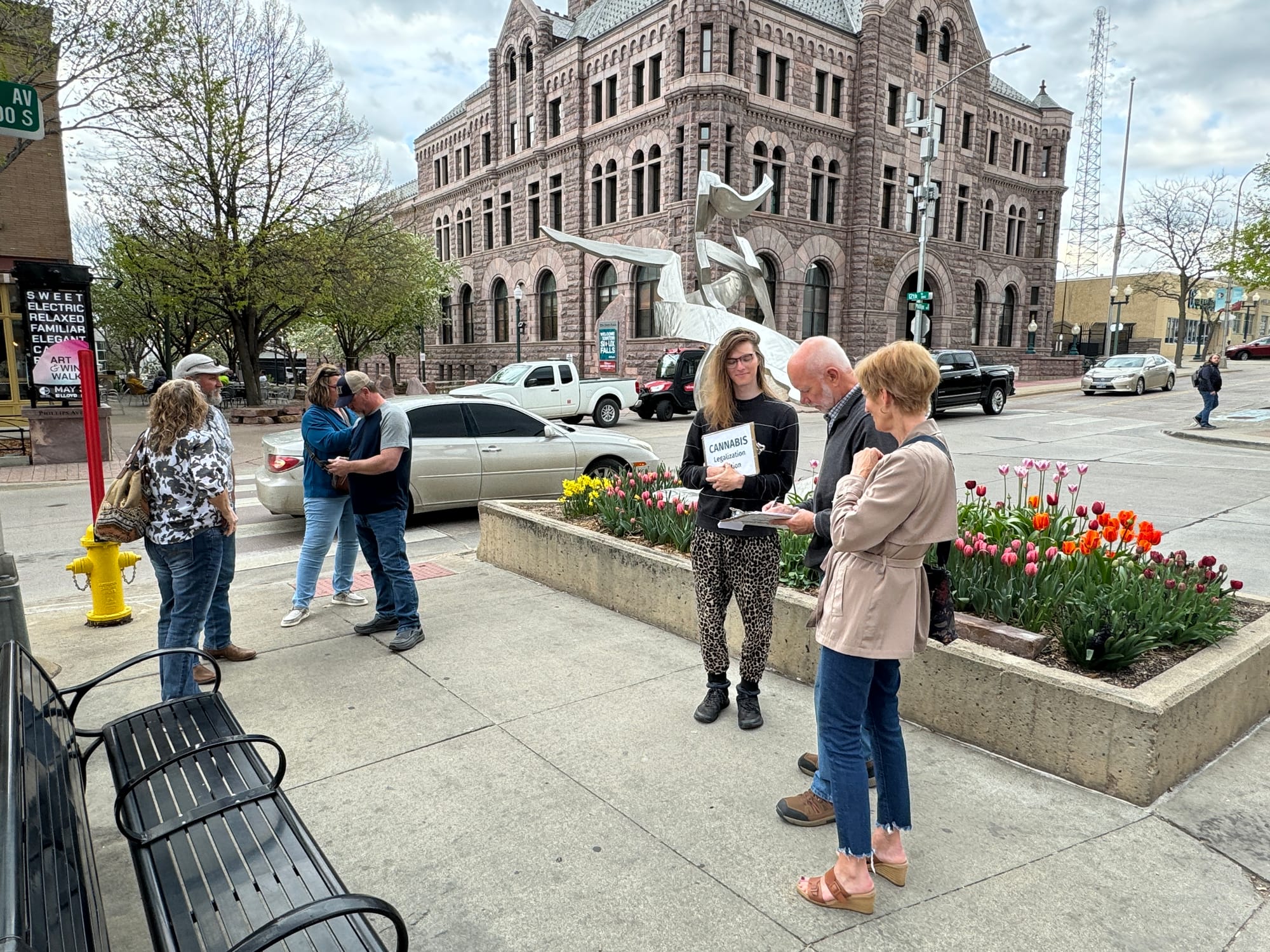
Stu Whitney/South Dakota News Watch
Support for ballot measures on abortion rights, open primaries and repealing the state food tax has dipped since May, according to a statewide poll co-sponsored by South Dakota News Watch.
The Chiesman Center for Democracy at the University of South Dakota also sponsored the Oct. 12-16 scientific survey of 500 registered voters by Mason-Dixon Polling and Strategy. Those interviewed were selected randomly from a telephone-matched state voter registration list that included landline and cell numbers. Quotas were assigned to reflect voter registration by county.
One of the main takeaways is that a high-stakes battle over abortion access in South Dakota is too close to call.
Amendment G, a citizen-led effort to enshrine abortion rights in the state constitution, is supported by half (50%) of South Dakota’s registered voters and opposed by nearly as many (47%), with about two weeks left until the Nov. 5 election; 3% are undecided.
That’s within the margin of error of 4.5 percentage points and a major shift from a similar poll in May, which found a nearly 20-point margin with 53% favoring Amendment G and 35% opposed, with 11% undecided.
If passed, the amendment would reverse a South Dakota abortion ban enacted when the U.S. Supreme Court overturned Roe v. Wade in 2022, leaving states to determine reproductive rights.
The jump in opposition could be a sign that efforts by anti-abortion groups to characterize Amendment G as “too extreme” have resonated with previously undecided voters.
“One of the main points is that voters are now more clear on their stances,” said Julia Hellwege, an associate political science professor at USD and director of the Chiesman Center. “A willingness to be undecided on an issue in May has now formed into a stance as the election approaches.”
The co-founders of Life Defense Fund, an anti-abortion group formed to provide organized opposition to the amendment, said in a statement to News Watch following the poll in May that more information would lead to shifting opinions.
“The more people learn that this extreme amendment approves late-term abortion and bans physical health protections for mothers, the more they will reject it,” Republican state legislator Jon Hansen and longtime anti-abortion advocate Leslee Unruh said in the statement.
Dakotans for Health, the grassroots organization that sponsored the measure, pushed back by saying the amendment uses the same trimester framework as Roe v. Wade, an opinion shared by Hannah Haksgaard, a professor at the University of South Dakota Knudson School of Law.

“The proposed amendment is very closely aligned with the original Roe v. Wade framework,” Haksgaard told News Watch in 2023. “The language mimics the trimester framework of Roe v. Wade and nothing in this amendment indicates any abortion rights more extreme than that.”
The amendment establishes that no regulation would be allowed in the first trimester, regulation must be reasonably related to the physical health of the pregnant woman in the second trimester, and in the third trimester regulation or prohibition of abortion would be allowed except in those cases where the abortion is necessary to preserve the life or health of the pregnant woman.
In the News Watch poll, just 26% of Republican respondents said they plan to vote for Amendment G, with 72% opposed and 2% undecided. That’s a sizable drop in support from the May survey, which saw 46% of Republicans in favor, 41% opposed and 14% undecided.
It’s a sign that moderate or otherwise undecided GOP voters have “come home” on the issue after an acrimonious campaign that included protests at petition sites and a still-pending lawsuit over how signatures were gathered.

Statewide, 55% of female respondents said they support the abortion measure, compared to 44% of males.
Support was also strongest among the youngest age group (18-34) at 60%, followed by age 35-49 with 53%, age 50-64 with 49% and age 65-older with 40%.
South Dakota law makes it a Class 6 felony for anyone “who administers to any pregnant female or prescribes or procures for any pregnant female” a means for an abortion, except to save the life of the mother. South Dakota is one of 14 states whose abortion law does not include exceptions for rape and incest.
Amendment H: Open primaries opposed by 56%
The News Watch poll showed that South Dakotans have begun to sour on Amendment H, a citizen-led proposal to change the way the state conducts primary elections.
The survey showed that just 40% of statewide respondents plan to vote for the amendment, which would establish “top-two” primaries for governor, Congress and state legislative and county races rather than having parties hold separate primary contests. Opposition polled at 56%, with 4% undecided.
The results are a major downturn from the May survey, when 55% of respondents supported Amendment H, compared to 33% opposed and 12% undecided.
South Dakota Open Primaries chairman Joe Kirby has framed the issue as one of fairness, pointing to the fact that all registered voters would be eligible to participate under the new primary model. Currently, Independent voters in South Dakota can vote in Democratic primaries but not Republican contests.
Supporters also said that open primaries will produce officeholders more reflective of the general electorate, rather than incentivizing candidates to take extreme positions to win a partisan primary.
The campaign’s message has been well-received by Independents, 58% of whom favor the amendment in the most recent poll, roughly the same as the May survey (59%).
But support has dipped among Republicans (40% in May to 26% in October) and Democrats (82% in May to 56% in October) as both the Republican and Democratic state parties formally opposed the measure.

South Dakota Democratic Party executive director Dan Ahlers said open primaries would be a “permanent, untested revision” to the state constitution and referenced California and Washington, the only other two states with top-two primaries for statewide elections.
“In those states, the minority parties are regularly locked out of elections and there is no evidence to suggest that the change has improved the quality of candidates or increased voter turnout,” Ahlers said.
Kirby countered that the “party bosses don’t like Amendment H because it would take political power back from them and return it to the voters where it belongs.”
IM 28: Support slipping for grocery tax repeal
Another ballot measure with sinking support is Initiated Measure 28, which would prohibit the state from collecting sales tax on “anything sold for human consumption, except alcoholic beverages and prepared food.”
The News Watch poll showed that 49% of statewide respondents plan on voting for IM 28, compared to 45% who are opposed, with 6% undecided.
Those numbers, within the margin of error, are a striking change from the May survey, which showed 66% of voters supporting the grocery tax repeal, with 26% opposed and 7% undecided.
The measure still has support from 56% of Democratic and 58% of Independent registered voters, but just 26% of Republicans said they plan on voting for it, a significant decline from the May survey, when 56% were in favor.
The polling shift reflects a coordinated opposition campaign by groups such as the South Dakota Retailers Association and South Dakota Municipal League to raise doubts about the fiscal impact of the measure.
Supporters call the measure a long-overdue effort to take the burden off low-income families and individuals by repealing the state’s 4.2% sales tax on groceries. South Dakota is one of just two states, along with Mississippi, that fully taxes food without offering credits or rebates.
Families and individuals who qualify for Supplemental Nutrition Assistance Program (SNAP) benefits, also known as food stamps, are not taxed on purchases made through that federal program.

Opponents criticize the wording of the measure as broader than just groceries. They said it could cause a budget crunch by preventing the state from collecting sales tax on “consumable” items such as tobacco, toothpaste and toilet paper.
Estimates for the loss of state revenue range from $124 million to $646 million annually. Attorney General Marty Jackley stated in his ballot explanation that “judicial or legislative clarification of the measure will be necessary.”
IM 29: Majority opposes recreational pot
The latest attempt to legalize recreational marijuana in South Dakota has seen a slight uptick in support among registered voters, but more than half of those polled still oppose the measure.
Initiated Measure 29 would allow people 21 and older to “possess, grow, ingest, and distribute marijuana or marijuana paraphernalia.” Possession would be allowed up to 2 ounces in a form other than marijuana concentrate or other marijuana products.
The News Watch poll showed that 44% of statewide respondents plan on voting yes, while 51% oppose IM 29 and 5% are undecided. That’s slightly more support than the 42% who indicated yes in the May survey, while opposition remained a slim majority, moving from 52% to 51%.
While 75% of Democrats and 56% of Independents support legalization, just 26% of Republicans said they will be voting for IM 29, a metric that hasn’t moved much since the May survey, when GOP support was 23%.
Recreational marijuana is legal in 23 states and the District of Columbia, with supporters pointing to economic advantages to the state economy from tax revenue. States collected nearly $3 billion in marijuana revenues in 2022, according to the Tax Foundation.
Opponents cite potential social costs and health risks such as a higher risk of cardiovascular problems from marijuana use, as outlined in a recent study in the Journal of the American Heart Association.
Both sides have accused the other of exaggerating the benefits or pitfalls of legalization. But South Dakotans should be well-versed on an issue that is on the state ballot for a third consecutive election cycle.
In 2020, pro-legalization Amendment A passed with 54% of the vote, clearing the way for recreational marijuana to be implemented in the state. Medicinal pot was also approved by voters that year in an initiated measure.

Gov. Kristi Noem’s administration challenged the recreational marijuana amendment, saying it violated the state’s requirement that constitutional amendments deal with just one subject. That argument prevailed in the South Dakota Supreme Court.
Supporters tried to pass recreational cannabis again in 2022 and South Dakotans rejected that effort, with 53% of voters against it.
Amendment E: Voters oppose changing male-only references
Amendment E, a legislative effort to change outdated male-only references to South Dakota’s governor and other officials in the state constitution, is not faring well with registered voters in the state.
The News Watch poll showed that 66% of statewide respondents oppose the amendment, compared to 30% in favor and just 3% undecided.
The attorney general’s explanation offers the following example: When referencing the governor, instead of saying “he shall be commander-in-chief of the armed forces of the state,” the text will be changed to read “the governor shall be commander-in-chief of the armed forces of the state.”
The amendment also includes references to officeholders such as lieutenant governor, Supreme Court justices, and Circuit Court judges as well as general classes of people such as persons, electors and public officers.
Some Republicans have alluded to national conversations about gender pronouns in opposing what is largely a procedural change. The poll found that just 14% of Republican respondents support the measure, compared to 53% of Democrats.
In the secretary of state’s ballot question pamphlet, Rep. Liz May, R-Kyle, called the current use of generic male pronouns “proper style and form” and said that the usage does not prevent women from holding public office.
“While this seems like a minor change now, opening up the constitution in order to correct pronouns will not accomplish anything substantive, but will cost taxpayer dollars to reprint materials that are already effective in their current form,” May said.
Sen. Erin Tobin, R-Winner, countered that “South Dakota has a long history of strong female representation in all three branches of government, and the Constitution should accurately reflect these esteemed members of our government.”
